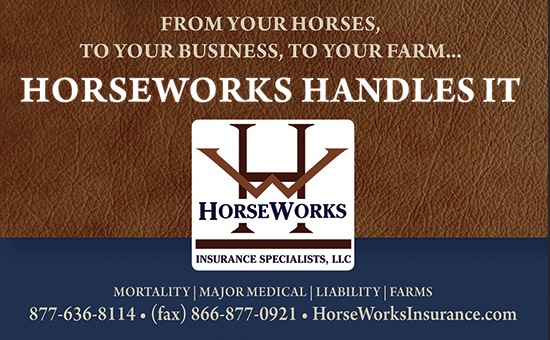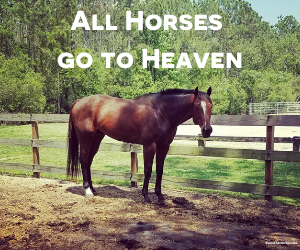|
By: Cristin Bertolino As an equine insurance agent, I have to admit, I love my job. I get to help my fellow equestrians find coverage that works for them, and we get to relate on all things horsey along the way. I don’t have to worry about being judged for my Danskos, or my desk full of horse pictures. I get to help my tribe find what they need! It’s kind of amazing. With that said, I want to emphasis how essential insurance is to your business and protecting those that you love, four-‐legged and two. I get it. I’ve been on the other side of the table. Before I was an agent I had no idea what I was buying, and had so many questions I was afraid to ask. I’m here to help, and I’m excited to do it. I’ve put together a quick two‐part guide, to help you beef up on the ins and outs of equine insurance. We’ll kick off Part One with the coverage most people are interested in, Equine Mortality & Major Medical. While this coverage may seem straightforward, I’ll review the most common questions we see everyday. Equine MortalityGeneral Mortality coverage is essentially life insurance for the horse. This coverage reimburses the owner for the fair market value of the horse in the event of death or humane euthanasia due to accident, injury, illness, or disease. How is fair market value determined? Fair market value reflects the current value of your horse. This figure is usually determined by purchase price, however, if the horse was purchased more than 12 months prior to writing the policy, underwriting may request a little justification of value to show that this original purchase price still stands. Also, it’s reasonable to request a value higher than the purchase price if you have invested in showing and training your horse since purchase. How do I justify my horse’s value? For show horses the easiest way to prove value is by submitting show records and/or training expenses. You can look at these records like your horse’s resume; the horse’s value should increase concurrent to its experience level. If you’re looking to insure a horse you’ve bred, the stud fee, broodmare care, and inspection performance can all be taken into consideration when assigning value. It should be noted that the cost of board and care (shoes, shots, etc.) should not be included in these expenses. These are costs associated with keeping a horse, not investing and increasing the value of a horse. I purchased Steady Eddie five years ago, and could easily sell him for twice what I originally paid. This is a totally reasonable request, and we see this all the time. We work with professionals and amateurs alike who are developing and investing in their horses, and they want to protect that investment. Again, underwriting would request show records and approximate training fees invested since purchase to help justify any coverage amount that is over and above the original purchase price. My friend gave me Petunia for a $1, but I could easily sell her for $20,000. In these instances we recommend that you have a third party appraiser, or industry professional (trainer, judge, etc.) write a letter, attesting to the horse’s fair market value. ‘In my professional opinion, this horse is worth ‘x’ amount. It’s currently schooling Second level, and shows potential for further development.’ This, along with any training fees and show records can often justify the requested fair market value for underwriting. Major Medical/Surgical CoverageGeneral Mortality coverage qualifies the horse for Major Medical/Surgical coverage, which is essentially the horse’s health insurance. There are different coverage amounts available and these packages are designed to reimburse the owner for reasonable and customary expenses associated with accident, illness, injury, or disease after a deductible has been satisfied. How much is a deductible, and how often do I have to pay one? Our agency works with a handful of underwriters who offer different packages. In general we’re seeing deductibles around $400 per claim. A deductible is applied to each filed claimed. If the vet has to come out repeatedly to treat the same issue, the deductible is subtracted from the total covered costs, not each vet bill. I’m only interested in Major Medical/Surgical coverage. Major Medical/Surgical coverage cannot be obtained without underlying General Mortality coverage in place. The General Mortality coverage amount determines which Major Medical/Surgical packages the horse is eligible for. The horse’s insured value has to meet or exceed the Major Medical package amount, with Major Medical packages starting at $7,500. This is a new caveat insurance carriers have been requiring over the last few years. If your current underwriter does not require this, this change may be coming down the pike. I’m only worried about Colic Surgery. In these instances we would recommend a strictly Surgical plan. The premium and deductible are more affordable, however, you are giving up the diagnostic end of Major Medical coverage. With a Surgical plan, if surgery is required, diagnostic work is covered, however if Hank comes in from the field three-‐legged lame, Surgical does not touch diagnostic treatment. We rarely write this coverage alone, as most of our clientele want that diagnostic component provided by the full Major Medical/Surgical package. Points to remember!Insurance is a regulated product. Any time you see a large disparity between quotes with different carriers, we recommend you ask your agent to review the finer points of the coverage. In general, this is a product that doesn’t necessarily show a lot of variation. If you come across a significant variation, the carrier may be making up for it through a higher deductible, applying a co‐pay, or cutting corners on coverage. You have the right to ask! Ask us! We are the few people who get excited about this stuff, and our job is to advocate for you, answer your questions, and heck, if we don’t know the answer, we’ll do our best to find out.
Until next time! Happy riding! Cristin Bertolino is an agent with HorseWorks Insurance Specialists. When she’s not connecting with her fellow equestrians regarding insurance, her husband can usually find her in the kitchen, tack store, and/or Dressage arena.
2 Comments
Elizabeth
6/13/2018 11:12:41 pm
Very interesting! How did you get started in Equine Insurance?
Reply
1/31/2021 07:09:01 pm
Wow! Excellent. When I'm reading the whole content I feel so smart. Very informative article that helps me a lot. I will share this to my friends and classmates. Wait. Just sharing this website (www.horses-haarlem-oil.com), I read also about the benefits of their products. By the way, I am so happy to read your content here. I will share this link/website of you to my fellows. Thank you and God bless! Have a great day, ahead!
Reply
Leave a Reply. |
|


 RSS Feed
RSS Feed




